Government Accountability and Data
For decades now, a hallmark of American politics has been the public’s distrust of government and frustration with the ways in which that distrust interferes with the smooth functioning of government systems. Recent events, such as the Cambridge Analytica and Edward Snowden scandals, have had a direct impact on Americans’ confidence in government bodies and corporations in terms of their data use and ignited new efforts to increase government data transparency.
To gauge the confidence of the general public toward data stewardship efforts put in place by governments and corporations, we surveyed over 1,000 Americans. Unsurprisingly, people tended to be dissatisfied rather than satisfied, and they had some interesting opinions about the types of information that should – and should not – be shared by the government.
The Freedom of Information Act (FOIA), one of the public’s greatest tools for ensuring government accountability, allows citizens to make requests to government agencies for data. Our survey also delved into the American public’s knowledge of FOIA, and we leveraged data from the federal Office of Information Policy to examine how the public makes use of this tool.
Key Findings
- Overall, less than a third of Americans were confident that government bodies will reliably share information they are legally required to disclose.
- Americans were more mistrustful of how corporations handle their data than they were of governments or employers.
- Less than half (48%) of Americans were familiar with the Freedom of Information Act (FOIA).
- Requests to the Department of Homeland Security accounted for more than half (50.3%) of all FOIA requests submitted in 2020.
Government Transparency Efforts Leave Americans Dissatisfied
To get a general feeling of American citizens’ confidence in the government, we started by checking their satisfaction with the transparency of various governing bodies.
Unsurprisingly, the general level of confidence was not very high. Less than half of respondents were very satisfied with the transparency of federal, state, or city governments overall. Citizens identifying themselves as independents showed the least confidence, while Democrats seemed to be more confident than others.
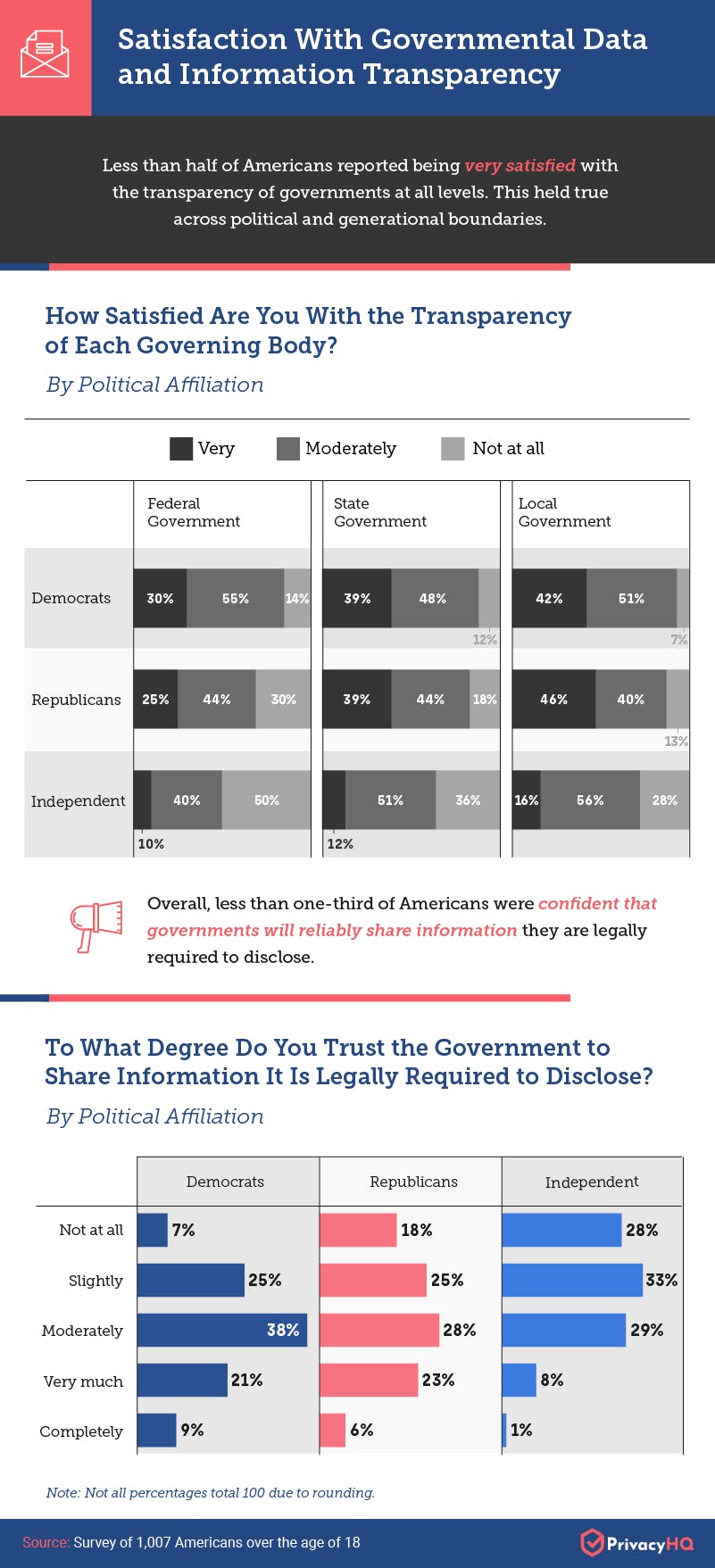
While political affiliation clearly influences the level of trust respondents have in all levels of government, it’s interesting to note that Democratic and Republican sentiments are more closely aligned with one another than with those of our independent respondents, who were generally significantly more skeptical of government data transparency.
Limited trust levels were also shown when we asked our respondents if they were confident that governments would reliably share information they were legally obliged to disclose. Overall, 14% did not trust the government at all, while less than a third of people were very or completely confident.
Survey results indicate that people living in the Western and Southern United States are more satisfied with how their state governments operate. This could be due to increased local transparency initiatives, cultures of participation in local government, or other factors, but overall, respondents across the nation seem to feel more confident toward their local government bodies than state or federal ones.
Trust in Employers Tops Trust in Governments or Corporations
Collecting and using data is also a big part of company business models, especially those working in social media. To compare confidence levels in the aforementioned entities with other bodies, we asked people for their opinion of corporation and employer data handling as well.
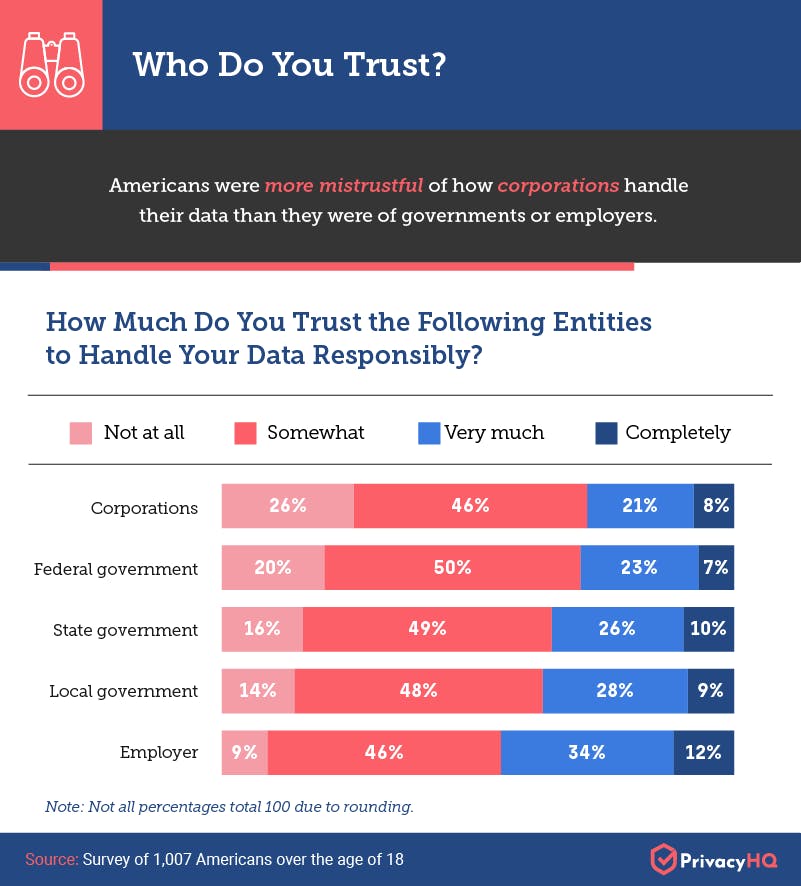
Overall, most people distrusted corporations even more than their governing bodies, with over a quarter of respondents claiming not to trust them at all when it comes to handling their data responsibly.
However, if we look at the statistics in further detail, political opinions and age brackets can notably change responses. The data showed that 36% of Republicans trusted corporations very much, compared to 31% for Democrats and 12% for independents.
The generations surveyed had varying levels of trust in each authority: Millennials were less likely to trust businesses than any other generation, while baby boomers were more distrusting of the federal government. Gen Xers were more trusting of their employers than other age groups (14% trusted their employer completely with their data).
Ranking the Most Important Types of Government Data
The term “data” – and especially Big Data – is rather vague precisely because it encompasses so much. People have different interests or perceptions of what kind of data is important. We asked our respondents what type of data is most crucial for the public to be able to access.
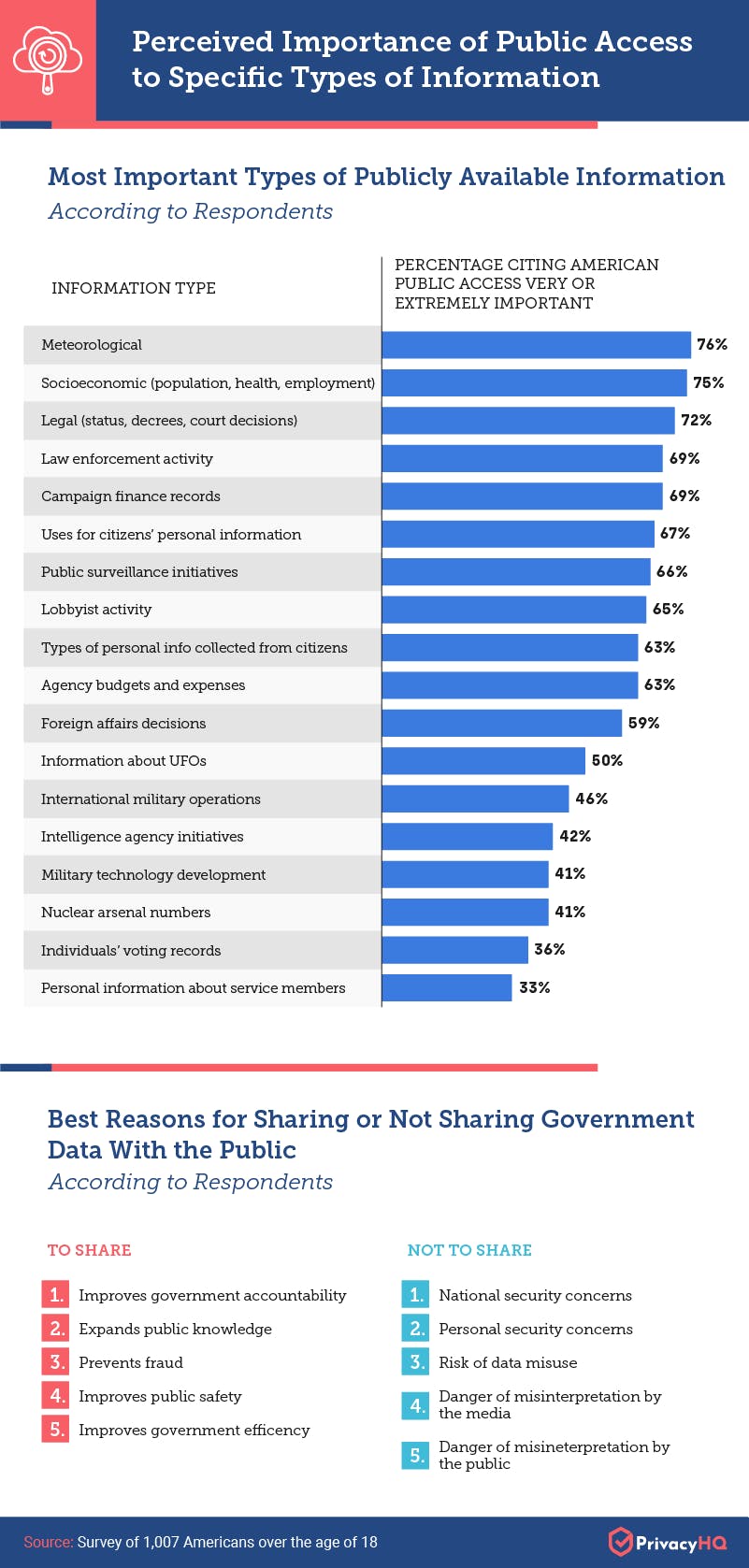
The results showed how broad the interests of the public were. Socioeconomic, legal, and law enforcement data came in the top five. Half of our respondents felt data regarding UFOs should be accessible to the public, ahead of any data relating to military technology or nuclear arsenals. A recent poll shows that the majority of Americans believe in intelligent alien life, shedding some light on the public’s interest in this type of information.
When looking at reasons for making government data accessible to the public, results showed that people think public knowledge is a more pressing reason than public safety. The most important reason for sharing data was government accountability, which has some logic when looking at the confidence levels mentioned above. In terms of reasons not to share government data, our survey indicated that people are more concerned about national security than their own personal safety.
Most Americans Unfamiliar With FOIA
Since 1967, the Freedom of Information Act (FOIA) has given the public access to information from any federal agency unless its release would interfere with protecting interests, such as personal privacy or national security.
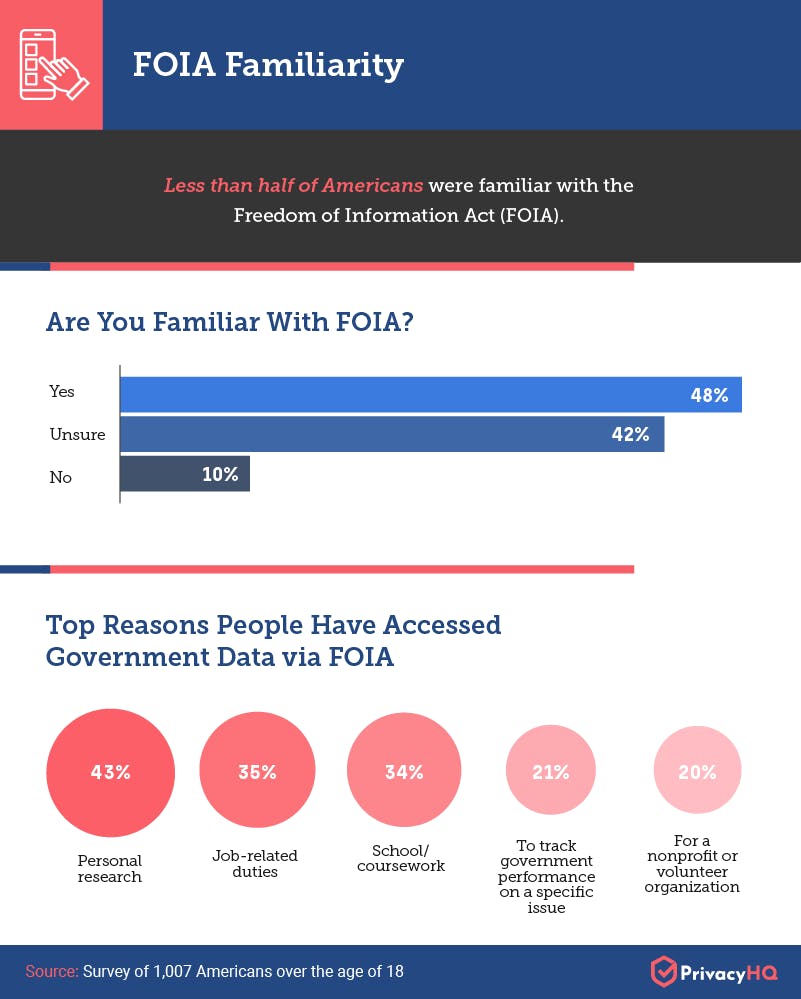
As this is a tool for government accountability, we asked our respondents how familiar they were with it. Ten percent did not know what the FOIA was at all, while only 48% were informed on the act. There were no major differences in these percentages when breaking the answers down by political affiliation.
Depending on the type of data requested, demands under the FOIA may have to be made directly to the government department or agency in question. In some cases, requests can be made online via the FOIA website.
According to reported figures from government agencies, in recent years, citizens have made around 800,000 demands under the FOIA annually. For those who knew and had used the FOIA to request information, the most common reason was for personal research, followed by work duties or school homework.
Homeland Security Received More Than Half of 2020 FOIA Requests
To dig further into how citizens use the FOIA, we had a look at the breakdown of FOIA requests for 2020 and which top 10 agencies received the most. Half of them were made to the Department of Homeland Security, making it the agency that received the most requests last year. The departments of Justice and Defense (with 10% and 6% of the requests, respectively) were those most contacted after Homeland Security.
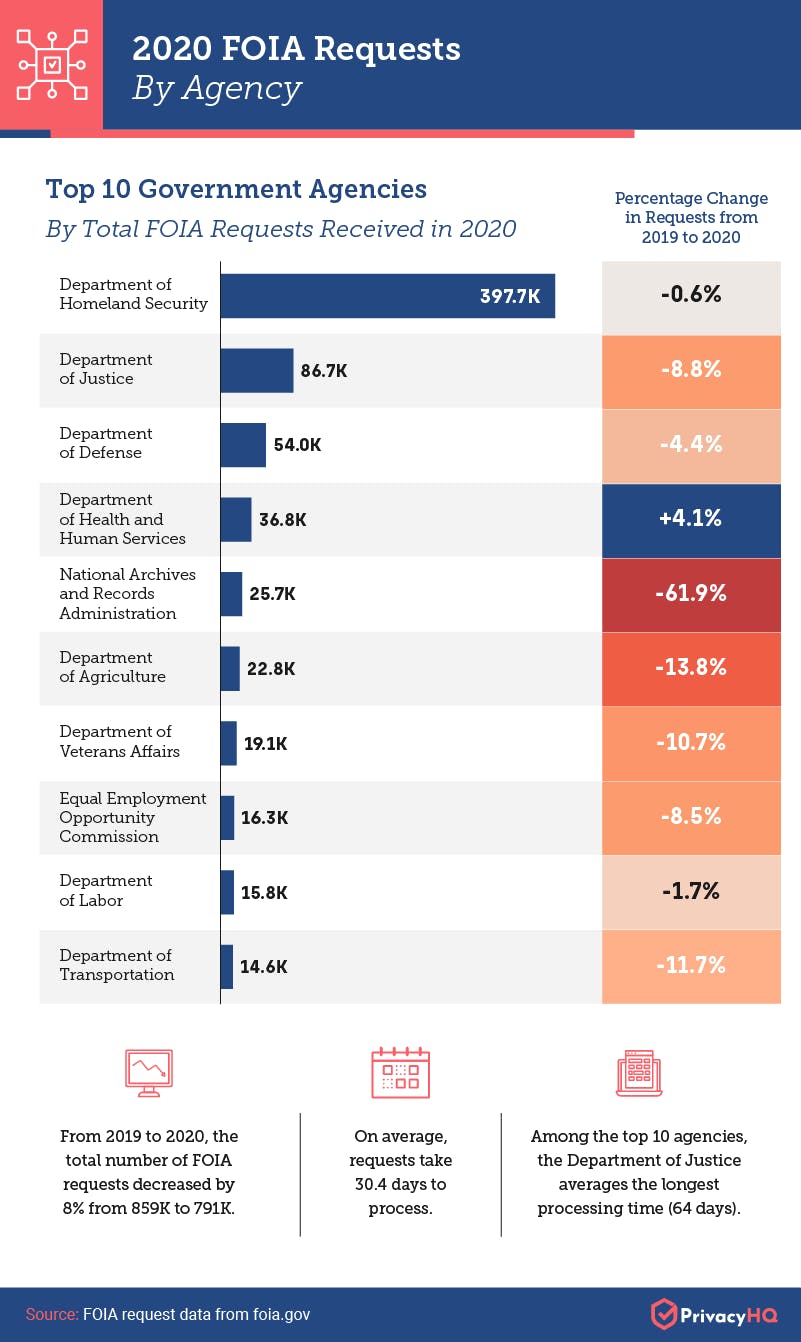
The overall number of requests has slightly declined yearly since 2018, and the only agency with increased requests in 2020 was the Department of Health and Human Services. As the Centers for Disease Control and Prevention (CDC) is part of the Department of Health and Human Services, the increase in requests is likely linked to the COVID-19 pandemic.
Under the FOIA, information that could pose a threat to an individual, national security, or a number of other interests does not have to be released by government agencies. We therefore also looked at the most common FOIA exemption categories used by each agency to reject information requests.
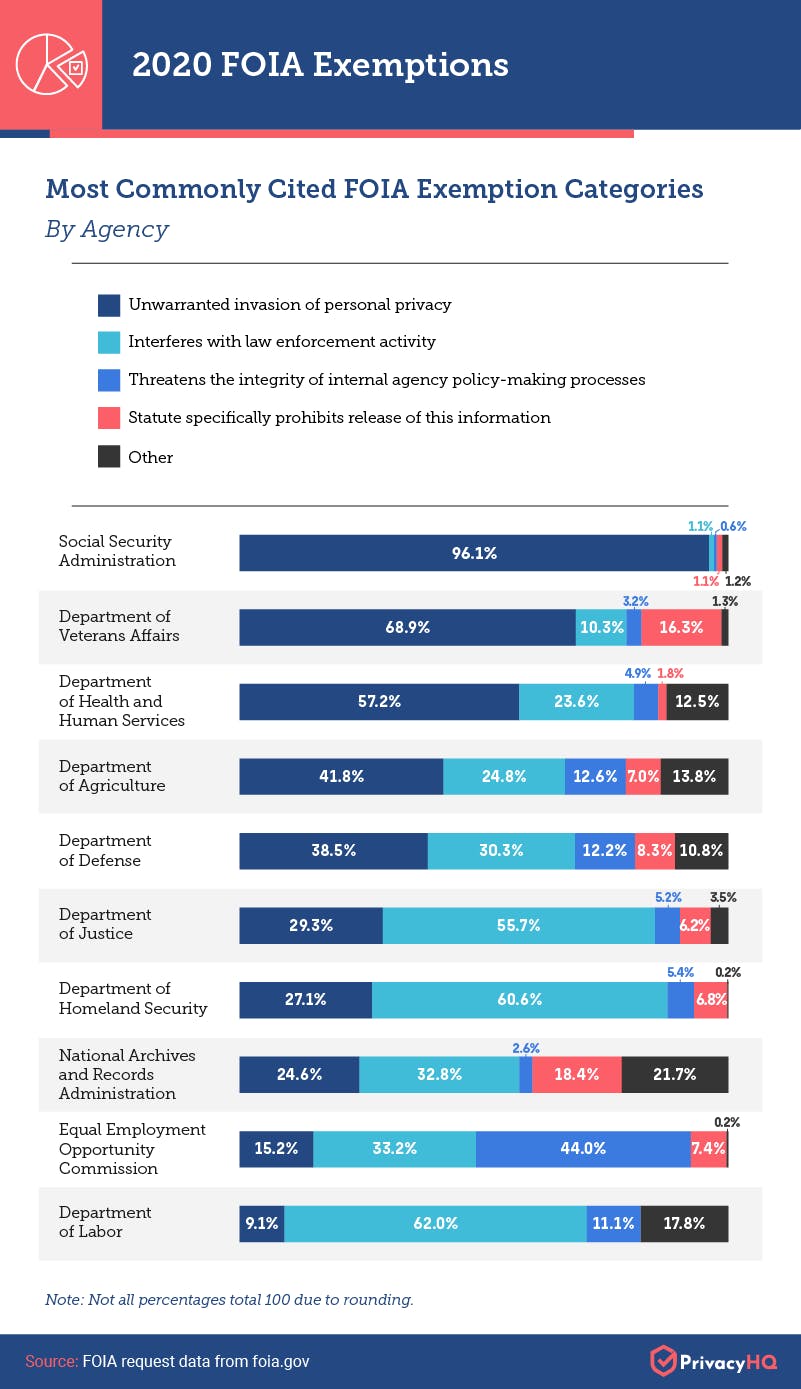
Homeland Security and the Department of Justice, receiving the most requests, used law enforcement exemption as the most common cause for refusal to release data at 60.6% and 55.7%, respectively.
Conclusion
Our results seem to be in line with other research on trust in government: The public is rather dissatisfied with the level of transparency from government agencies and seems to distrust companies in particular when it comes to handling their personal data.
However, the general public also seems quite unfamiliar with the FOIA and what it means for government bodies and agencies, despite FOIA being a powerful tool to enforce government accountability. Out of the 800,000 requests filed annually under the FOIA, the Department of Homeland Security deals with around 50%. When declining to release information, it is most often under the exemption regarding law enforcement.
If you, like others, find yourself worrying that government processes are too opaque or arcane to understand, check out organizations that work to educate the public by accessing FOIA requests and other tools, or perhaps do some digging on your own to find what is truly available.
Methodology and Limitations
This study uses data from a survey of 1,007 people located in the U.S. Survey respondents were presented with a series of questions, including attention-check and disqualification questions. 58.2% of respondents identified as men, while 41% identified as women, and less than 1% reported an alternate gender identity or declined to provide their gender.
Respondents ranged in age from 19 to 80 with an average age of 39. 55.4% of respondents were millennials, 24.9% were Gen Xers, 11.5% were baby boomers, and 6.6% were Gen Zers. The remaining 1.6% came from older generations. With a confidence interval of 95%, this survey has a margin of error of 3%.
Please note that survey responses are self-reported and subject to exaggeration, recency bias, and telescoping.
Fair Use Statement
We freely share this study’s findings on Americans’ trust of government transparency. If you think your friends or family might be interested in them, you are welcome to use any of the information here for noncommercial purposes; however, please link back to this page whenever you share it.
